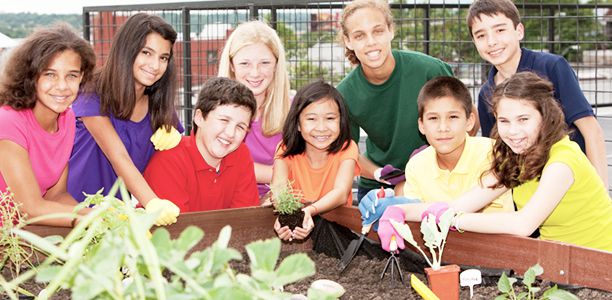In kitchens throughout Australia, many parents are worrying about their children’s diet.
Temptation lurks everywhere in an unhealthy mix of readily available junk food and energy drinks, pernicious advertising and the siren call of sedentary activities. What can parents do to set a good example and encourage their children to make healthy food choices?
According to ACU’s Associate Professor Shawn Somerset, an expert in nutrition and public health, the answer could lie in a very simple place – school gardens.
Working with colleagues at the University of Texas, Brisbane-based Associate Professor Somerset has recently published research which found that school gardens can have a positive effect on children’s health and behaviour, as well as the environment.
“We discovered that children who are involved with school gardens eat more vegetables and fruit. We also found that these children are willing to taste and cook a greater variety of vegetables and fruit and demonstrate improved behaviour both at home and in the classroom,” he said.
School gardens are rapidly growing in popularity in schools across the world. They have been championed by the likes of Michelle Obama and Jamie Oliver. The doyenne of Australian cookery, Stephanie Alexander, AO, is so passionate about them that she set up her own not-for-profit foundation to teach primary school children to grow, harvest and prepare vegetables.
Associate Professor Somerset said it was pleasing to see so much high-profile support for school gardens.
“It helps raise the profile of school gardens and brings them to a wider audience.”
Associate Professor Somerset and his colleagues assessed 13 school garden programs in Australia and the United States to examine their impact on children’s dietary behaviours and to identify similar helpful strategies used in the programs. The programs were either conducted during school hours or in after-school settings for children ranging from kindergarten to Year 8.
Of the 11 programs that examined dietary intake, six found that the program resulted in increased vegetable intake, whereas four showed no effect. Seven of the eight studies that measured the children’s preference found that the programs resulted in increased preference for vegetables.
“Our study also found that children involved in the programs had an improved attitude towards vegetables and fruit, could easily identify them and were more likely to taste and prepare or cook fruit and vegetables,” said Associate Professor Somerset.
Some of the similar successful strategies used in the programs included ‘hands-on’ elements such as teaching children how to cook and prepare the food, providing the ingredients, and, crucially, support for parents and teachers.
Associate Professor Somerset said the research indicated that school gardens have positive implications for sustainability, as well as children’s health.
“School gardens are a great model to integrate nutrition, environmental sustainability and education objectives. They introduce children to their local environment and encourage them to take care of it.”
But he said that further research was now needed to understand how to achieve long-term improvements in dietary behaviours and how to sustain and develop the programs in schools.
“Installing and using school gardens is not complicated, and many successful gardens have run purely on the energy of local school communities. Our study showed that international research in this area is sparse, but encouraging. Such community-based initiatives are highly cost effective and can potentially yield a raft of long term health and wellbeing outcomes. They therefore deserve a far larger share of the national research budget.”
So – the evidence is clear. School gardens develop children’s confidence, curiosity, and taste buds. They can, potentially, support positive lifelong eating habits too. What more encouragement could parents, teachers and children need to pick up a trowel and some seeds and start digging?
(Source: Australian Catholic University)











